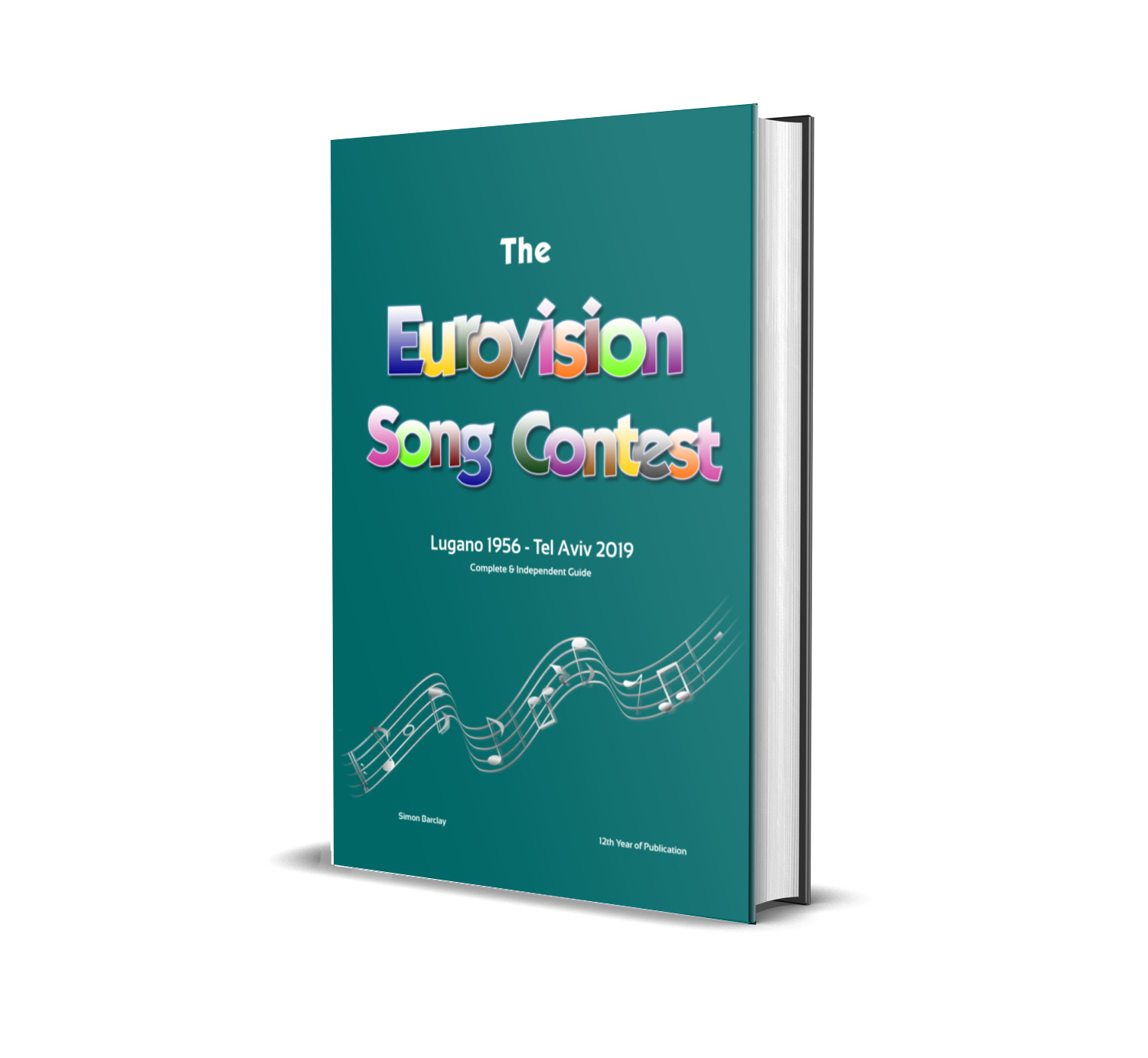Payments can be made securely by Paypal or by credit/debit card. The book will be dispatched in around 10-14 days, but please allow up to 28 days for delivery.
Note for EU customers: we pay the EU IOSS VAT so there will be no further charges when the book arrives.
|
|
|
Introduction to the 2019 Edition
The Eurovision Song Contest ventured outside Europe this year, with Israel hosting the contest following Netta’s win in 2018 with “Toy”. The organisers staged the 64th Contest in Tel Aviv’s 9,000 capacity Expo Pavilion, which was watched by an estimated 182 million television viewers. Broadcaster IPBC chose two male and two female presenters to present the two semi-finals and final, Erez Tal, Bar Refaeli, Assi Azar and Lucy Ayoub. It was the first time Israel had hosted the contest since 1999 and the third time overall.
Forty-one countries participated, two fewer than last year, we lost Bulgaria to funding issues and Ukraine to a dispute over contract terms between the Ukrainian national broadcaster and the winner of their selection competition.
Congratulations to Duncan Laurence and to the Netherlands who won Eurovision for the first time since way back in 1975. This was Netherlands’s fifth win overall. There were best-ever finishes by San Marino and the newly renamed North Macedonia who actually won the jury vote on the night.
There was controversy this year, when the Belarus jury was dismissed after they leaked details of their semi-final votes ahead of the Final. The EBU decided to use a representative calculated set of points in place of the Belarus jury but then managed to award them in reverse order by mistake. This led to Sweden being shown as the jury winners overall and not North Macedonia. The top four positions after both sets of points were fortunately not affected.
The “Big 5” continue to be mostly awful, with Germany receiving no points from the voting public and finishing second last, while the UK ended up rock bottom again. Italy proved it is possible to do well as an automatic qualifier though, finishing as runners-up. Hosts Israel received no points from the juries and finished a dismal 23rd.
Some interesting facts this year include Norway winning the public voting by some margin yet only finishing sixth. Netherlands’ win was achieved with only two 12 points from public voting in the final, and six maximums in total, a record beaten only by Azerbaijan in 2011. There was massive bloc voting this year by the public, with the Balkan countries in particular benefitting – on average those countries received ten times more points from their neighbours than from the other countries.
Contents
Eurovision Winners since 1956
Section One: Qualifying for the 2019 Contest
Section Two: Contest Details & Votes
Contest performers and voting tables: 1950's
Contest performers and voting tables: 1960's
Contest performers and voting tables: 1970's
Contest performers and voting tables: 1980's
Contest performers and voting tables: 1990's
Contest performers and voting tables: 2000's
Contest performers and voting tables : 2010's
2019 First Semi-Final performers, jury voting, televoting and combined results
2019 Second Semi-Final performers, jury voting, televoting and combined results
2019 Final performers, jury voting, televoting and combined results
2019 Final: Voting Order & Spokespersons
Round by Round voting & changes to scoreboard: Jury Voting
Round by Round voting & changes to scoreboard: Public Televoting & combined results
Previous voting sytem: First Semi-Final results
Previous voting sytem: Second Semi-Final results
Previous voting sytem: Final results
Country-by-Country History
Section Three: Statistics & Analysis
Predicting the Winners, the history of votes for the best song
Predicting the Winners, who gives the most 12's and who gives nothing
Marcel Bezençon Awards
OGAE poll result
Internal selection or national competition
Winners' Ages & Genders since 1956
2019 Contestants profile - singers & backing performers
Language history by country
Most Successful Countries League Table
Least Successful Countries League Table
Most Finishes in Top 3
Most Finishes in Bottom 3
Best & worst at qualifying from the semi-finals
Best semi-final to compete in
Most consecutive semi-final failures
Unluckiest semi-finals for each country
Performance of the "Big 5"
Running Order analysis, where is best to perform? Previous voting system
Running Order analysis, where is best to perform? New voting System
Winners & losers position in the order of performance since 1975
Double Douze!
Are You Sure? When Juries and the Public Disagree
Highest number of 12's received by one country
Lowest number of 12's received by a winning country
12 Points Go To… a 10 year history by country
History of 12 points from juries and public since 2016
Sharing The Love: the concentration of points awarded
The host country's performance since 1975
Nil Points!
Highest scores in finals
Largest and smallest winning margins
Performance of debutant countries since 1956
League Table of Appearances
Closest voting relationships
Each Country's Best Friends & their 10 year voting history
The most one-sided voting - who doesn't reciprocate?
And countries who have never voted for another
The least friendly pairs of countries: all results since 1975
The least friendly pairs of countries: the effect of the public vote from 2016 onwards
Jury/Public split of points in finals since 2016
Most Points Received since 1975
East v West - the impact of geographical voting
Bloc voting by juries and the public in the 2019 Final
Complete country-by-country voting analysis since 1975 - who votes for who?



No comments:
Post a Comment